基本句型及翻译
- 格式:ppt
- 大小:563.00 KB
- 文档页数:45
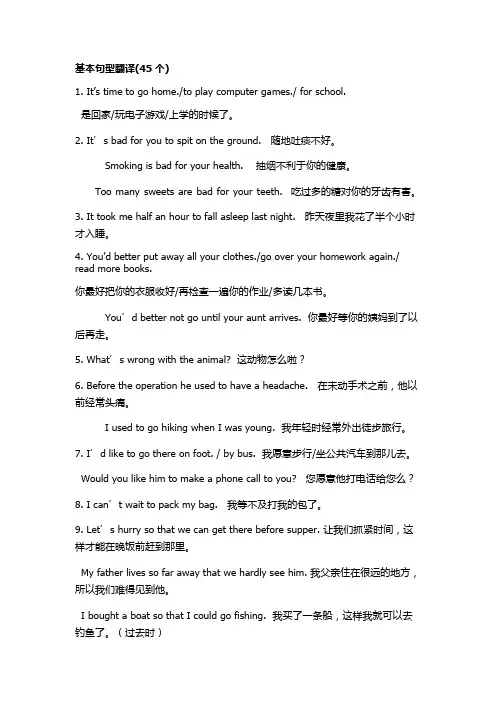
基本句型翻译(45个)1. It’s time to go home./to play computer games./ for school.是回家/玩电子游戏/上学的时候了。
2. It’s bad for you to spit on the ground. 随地吐痰不好。
Smoking is bad for your health. 抽烟不利于你的健康。
Too many sweets are bad for your teeth. 吃过多的糖对你的牙齿有害。
3. It took me half an hour to fall asleep last night. 昨天夜里我花了半个小时才入睡。
4. You’d better put away all your clothes./go over your homework again./ read more books.你最好把你的衣服收好/再检查一遍你的作业/多读几本书。
You’d better not go until your aunt arrives. 你最好等你的姨妈到了以后再走。
5. What’s wrong with the animal? 这动物怎么啦?6. Before the operation he used to have a headache. 在未动手术之前,他以前经常头痛。
I used to go hiking when I was young. 我年轻时经常外出徒步旅行。
7. I’d like to go there on foot. / by bus. 我愿意步行/坐公共汽车到那儿去。
Would you like him to make a phone call to you? 您愿意他打电话给您么?8. I can’t wait to pack my bag. 我等不及打我的包了。
9. Let’s hurry so that we can get there before supper. 让我们抓紧时间,这样才能在晚饭前赶到那里。
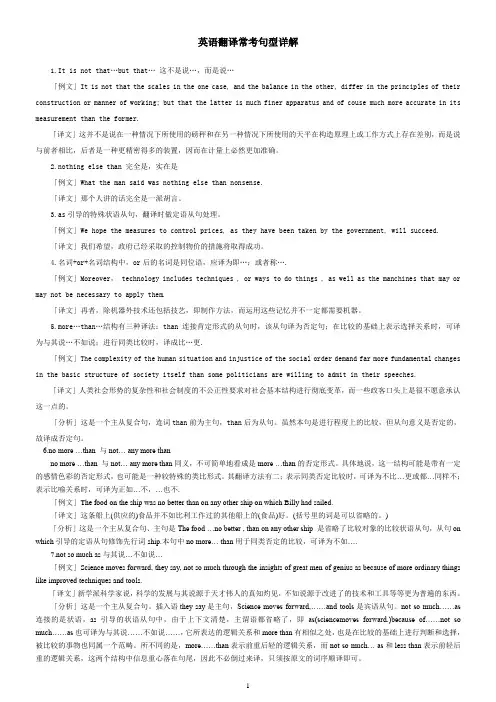
英语翻译常考句型详解1.It is not that…but that… 这不是说…,而是说…「例文」It is not that the scales in the one case, and the balance in the other, differ in the principles of their construction or manner of working; but that the latter is much finer apparatus and of couse much more accurate in its measurement than the former.「译文」这并不是说在一种情况下所使用的磅秤和在另一种情况下所使用的天平在构造原理上或工作方式上存在差别,而是说与前者相比,后者是一种更精密得多的装置,因而在计量上必然更加准确。
2.nothing else than 完全是,实在是「例文」What the man said was nothing else than nonsense.「译文」那个人讲的话完全是一派胡言。
3.as引导的特殊状语从句,翻译时做定语从句处理。
「例文」We hope the measures to control prices, as they have been taken by the government, will succeed.「译文」我们希望,政府已经采取的控制物价的措施将取得成功。
4.名词+or+名词结构中,or后的名词是同位语,应译为即…;或者称….「例文」Moreover, technology includes techniques , or ways to do things , as well as the manchines that may or may not be necessary to apply them.「译文」再者,除机器外技术还包括技艺,即制作方法,而运用这些记忆并不一定都需要机器。
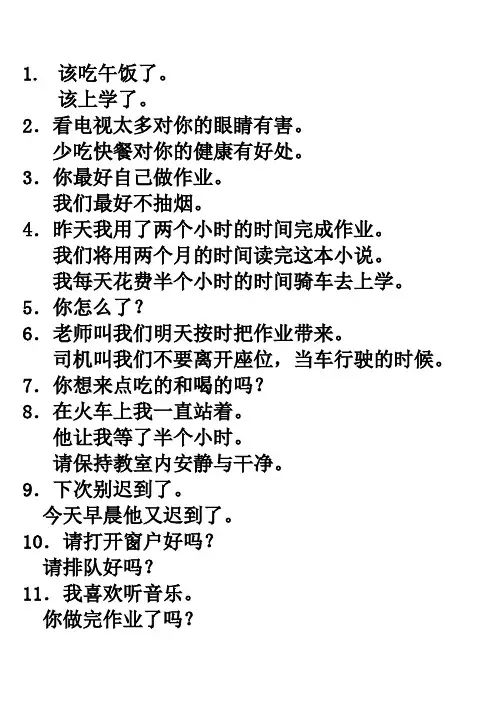
1.该吃午饭了。
该上学了。
2.看电视太多对你的眼睛有害。
少吃快餐对你的健康有好处。
3.你最好自己做作业。
我们最好不抽烟。
4.昨天我用了两个小时的时间完成作业。
我们将用两个月的时间读完这本小说。
我每天花费半个小时的时间骑车去上学。
5.你怎么了?6.老师叫我们明天按时把作业带来。
司机叫我们不要离开座位,当车行驶的时候。
7.你想来点吃的和喝的吗?8.在火车上我一直站着。
他让我等了半个小时。
请保持教室内安静与干净。
9.下次别迟到了。
今天早晨他又迟到了。
10.请打开窗户好吗?请排队好吗?11.我喜欢听音乐。
你做完作业了吗?我不喜欢游泳。
12.别管我。
那个大男孩把小女孩弄哭了。
13.我妈妈迫使我早点回家。
14.她太小了,不能去上学。
他太矮了,够不着电扇。
天太冷了,不能出去玩了。
15.我一点也不喜欢你。
我一点也不明白。
他根本就没给我打电话。
16.我妈妈和爸爸都不做饭。
17.要么你走,要么我走。
你和我,有一个人是对的。
18.我妈妈十点才回来。
我直到12点才完成作业。
他11点才睡觉。
19.别为我担心。
我害怕蛇。
20.对我来说学好英语很简单。
对孩子们来说,在马路上玩很危险。
21.我认为你不对。
我认为这个电影没意思。
我认为他自己做不了。
22.让我们停下来休息会儿吧。
别说了!老师来了。
23.给我一个苹果。
24.我的电脑出毛病了。
25.我喜欢游泳。
今天下午我喜欢去打乒乓球。
26.去散步怎么样?27.为什么不跟他们一起去摘苹果呢?28.我们的教室变得越来越干净。
天变长了。
29.那个男孩1、8米高。
那个楼有300米高。
长江有5米宽。
30.他和我一样高。
他不如我高。
31.在作业方面,他经常帮我。
他很少帮他妈妈打扫房间。
32.我一到上海就给你打电话。
她一听到这个消息就哭了。
33、刚才我看见她逃跑了。
我看见她正在隔壁的房间哭。
昨天晚上我听见他唱歌了。
34、我买这条裙子花了500元。
昨天我用了两个小时做作业。
35、她经常请我帮忙。
那个乞丐向我要钱。
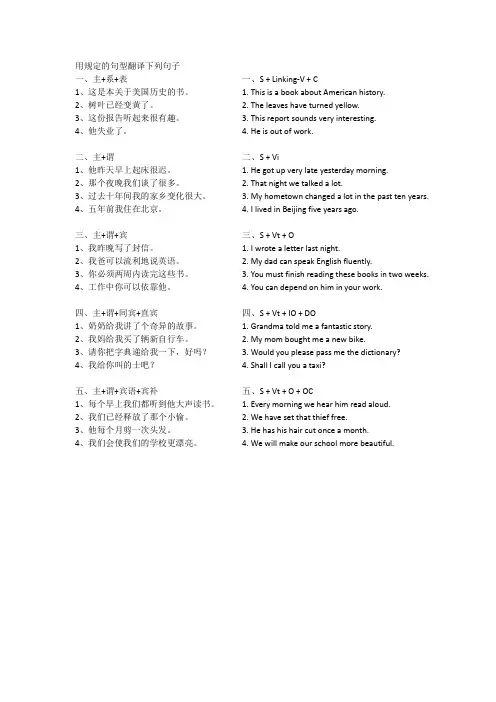
用规定的句型翻译下列句子一、主+系+表1、这是本关于美国历史的书。
2、树叶已经变黄了。
3、这份报告听起来很有趣。
4、他失业了。
二、主+谓1、他昨天早上起床很迟。
2、那个夜晚我们谈了很多。
3、过去十年间我的家乡变化很大。
4、五年前我住在北京。
三、主+谓+宾1、我昨晚写了封信。
2、我爸可以流利地说英语。
3、你必须两周内读完这些书。
4、工作中你可以依靠他。
四、主+谓+间宾+直宾1、奶奶给我讲了个奇异的故事。
2、我妈给我买了辆新自行车。
3、请你把字典递给我一下,好吗?4、我给你叫的士吧?五、主+谓+宾语+宾补1、每个早上我们都听到他大声读书。
2、我们已经释放了那个小偷。
3、他每个月剪一次头发。
4、我们会使我们的学校更漂亮。
一、S + Linking-V + C1. This is a book about American history.2. The leaves have turned yellow.3. This report sounds very interesting.4. He is out of work.二、S + Vi1. He got up very late yesterday morning.2. That night we talked a lot.3. My hometown changed a lot in the past ten years.4. I lived in Beijing five years ago.三、S + Vt + O1. I wrote a letter last night.2. My dad can speak English fluently.3. You must finish reading these books in two weeks.4. You can depend on him in your work.四、S + Vt + IO + DO1. Grandma told me a fantastic story.2. My mom bought me a new bike.3. Would you please pass me the dictionary?4. Shall I call you a taxi?五、S + Vt + O + OC1. Every morning we hear him read aloud.2. We have set that thief free.3. He has his hair cut once a month.4. We will make our school more beautiful.。
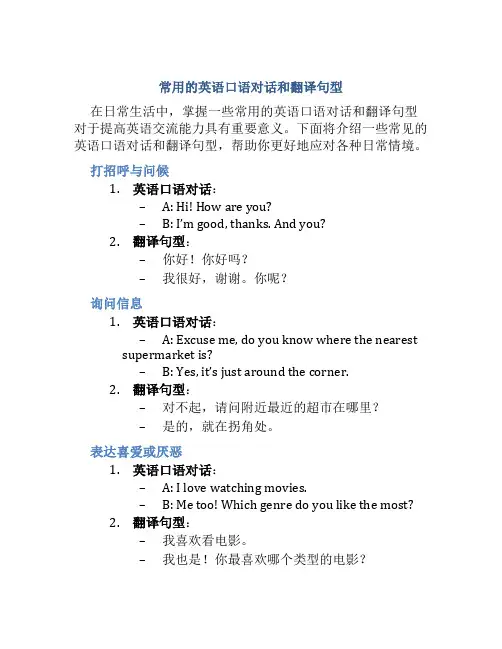
常用的英语口语对话和翻译句型在日常生活中,掌握一些常用的英语口语对话和翻译句型对于提高英语交流能力具有重要意义。
下面将介绍一些常见的英语口语对话和翻译句型,帮助你更好地应对各种日常情境。
打招呼与问候1.英语口语对话:–A: Hi! How are you?–B: I’m good, thanks. And you?2.翻译句型:–你好!你好吗?–我很好,谢谢。
你呢?询问信息1.英语口语对话:–A: Excuse me, do you know where the nearest supermarket is?–B: Yes, it’s just around the corner.2.翻译句型:–对不起,请问附近最近的超市在哪里?–是的,就在拐角处。
表达喜爱或厌恶1.英语口语对话:–A: I love watching movies.–B: Me too! Which genre do you like the most?2.翻译句型:–我喜欢看电影。
–我也是!你最喜欢哪个类型的电影?道歉与原谅1.英语口语对话:–A: I’m sorry for being late.–B: That’s okay. Don’t worry about it.2.翻译句型:–对不起,我迟到了。
–没关系,别担心。
谈论天气1.英语口语对话:–A: It’s such a nice day today, isn’t it?–B: Yes, the weather is perfect for a picnic.2.翻译句型:–今天天气真好,不是吗?–是的,天气正适合野餐。
咨询建议1.英语口语对话:–A: Can you give me some advice on how to improve my English?–B: Sure, practice speaking English every day.2.翻译句型:–你能给我一些建议,如何提高我的英语吗?–当然,每天练习说英语。
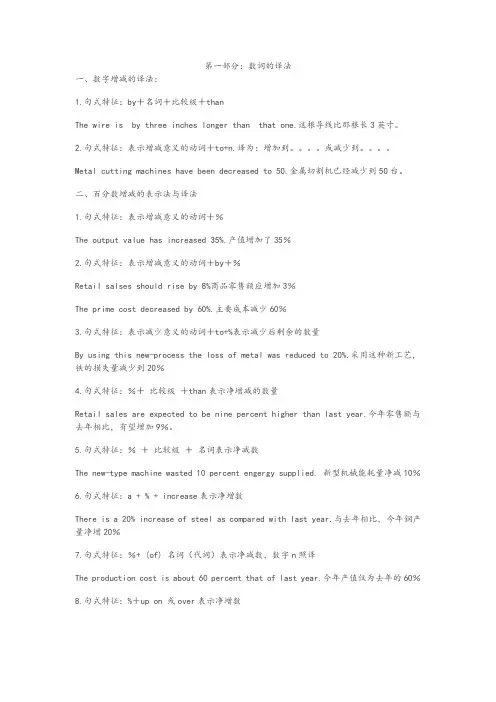
第一部分:数词的译法一、数字增减的译法:1.句式特征:by+名词+比较级+thanThe wire is by three inches longer than that one.这根导线比那根长3英寸。
2.句式特征:表示增减意义的动词+to+n.译为:增加到。
或减少到。
Metal cutting machines have been decreased to 50.金属切割机已经减少到50台。
二、百分数增减的表示法与译法1.句式特征:表示增减意义的动词+%The output value has increased 35%.产值增加了35%2.句式特征:表示增减意义的动词+by+%Retail salses should rise by 8%商品零售额应增加3%The prime cost decreased by 60%.主要成本减少60%3.句式特征:表示减少意义的动词+to+%表示减少后剩余的数量By using this new-process the loss of metal was reduced to 20%.采用这种新工艺,铁的损失量减少到20%4.句式特征:%+比较级+than表示净增减的数量Retail sales are expected to be nine percent higher than last year.今年零售额与去年相比,有望增加9%。
5.句式特征:%+比较级+名词表示净减数The new-type machine wasted 10 percent engergy supplied. 新型机械能耗量净减10%6.句式特征:a + % + increase表示净增数There is a 20% increase of steel as compared with last year.与去年相比,今年钢产量净增20%7.句式特征:%+ (of) 名词(代词)表示净减数,数字n照译The production cost is about 60 percent that of last year.今年产值仅为去年的60%8.句式特征:%+up on 或over表示净增数The grain output of last year in this province was 20% percent up on that of 1978.去年粮食产量比1978年净增20%。

汉英的基本句型及其翻译Sylvia Wang574521661@一、主谓单句1)鲁迅,绍兴人。
(主语+名词谓语)•Lu Xun was from Shaoxing. [SVP]2)这个姑娘很漂亮。
(主语+形容词谓语)•That girl is very pretty. [SVP]3) 这花儿是白的。
(主语+判断谓语)•The flower is white.[SVP]4) 水库是1958年修建的。
[主语+判断谓语]•The reservoir was built in 1958. [SV(passive)] 5) 他打破了杯子。
(主语+谓语+宾语)•He broke the glass.[SVO]6) 李先生教我们地理。
(主语+谓语+宾语+宾语)•Mr. Li teaches us geography.[SVOO]防止主语的机械对应•宁波多雨。
•Ningbo sees much rain.•It rains a lot in Ningbo.•People have much rain in Ningbo.•There is much rain in Ningbo.•中国近几年来发生了巨变.•China crackles with danamics of changes these years.•China has seen (withnessed) great changes these yeats.•These years have seen (witnessed) great changes in China.•There have been great changes in China these years.•Great changes have taken place in China these years.•花园里有许多孩子。
•There are many children in the garden.•门边卧着一只狗。
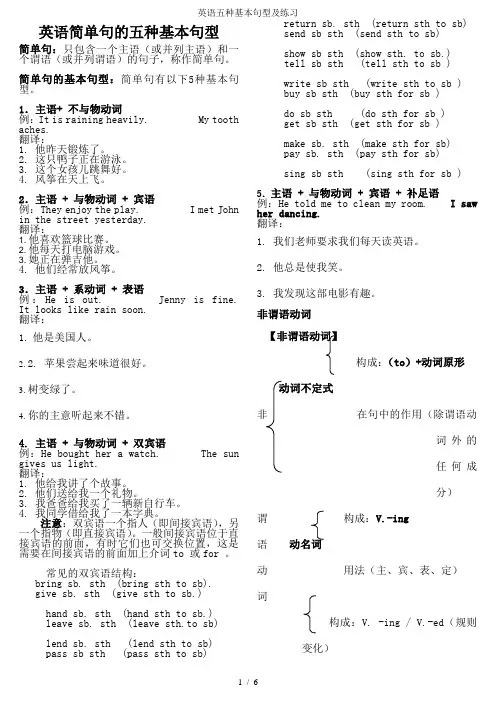
英语简单句的五种基本句型简单句:只包含一个主语(或并列主语)和一个谓语(或并列谓语)的句子,称作简单句。
简单句的基本句型:简单句有以下5种基本句型。
1.主语+ 不与物动词 例:It is raining heavily. My tooth aches. 翻译:1. 他昨天锻炼了。
2. 这只鸭子正在游泳。
3. 这个女孩儿跳舞好。
4. 风筝在天上飞。
2.主语 + 与物动词 + 宾语 例:They enjoy the play. I met John in the street yesterday. 翻译:1. 他喜欢篮球比赛。
2. 他每天打电脑游戏。
3. 她正在弹吉他。
4. 他们经常放风筝。
3.主语 + 系动词 + 表语例:He is out. Jenny is fine. It looks like rain soon.翻译:1. 他是美国人。
2. 2. 苹果尝起来味道很好。
3. 树变绿了。
4. 你的主意听起来不错。
4. 主语 + 与物动词 + 双宾语例:He bought her a watch. The sun gives us light. 翻译:1. 他给我讲了个故事。
2. 他们送给我一个礼物。
3. 我爸爸给我买了一辆新自行车。
4. 我同学借给我了一本字典。
注意:双宾语一个指人(即间接宾语),另一个指物(即直接宾语)。
一般间接宾语位于直接宾语的前面,有时它们也可交换位置,这是需要在间接宾语的前面加上介词to 或for 。
常见的双宾语结构:bring sb. sth (bring sth to sb). give sb. sth (give sth to sb.)hand sb. sth (hand sth to sb.) leave sb. sth (leave sth.to sb) lend sb. sth (lend sth to sb) pass sb sth (pass sth to sb)return sb. sth (return sth to sb) send sb sth (send sth to sb)show sb sth (show sth. to sb.)tell sb sth (tell sth to sb ) write sb sth (write sth to sb ) buy sb sth (buy sth for sb ) do sb sth (do sth for sb ) get sb sth (get sth for sb ) make sb. sth (make sth for sb) pay sb. sth (pay sth for sb)sing sb sth (sing sth for sb )5.主语 + 与物动词 + 宾语 + 补足语例:He told me to clean my room. I saw her dancing. 翻译:1. 我们老师要求我们每天读英语。
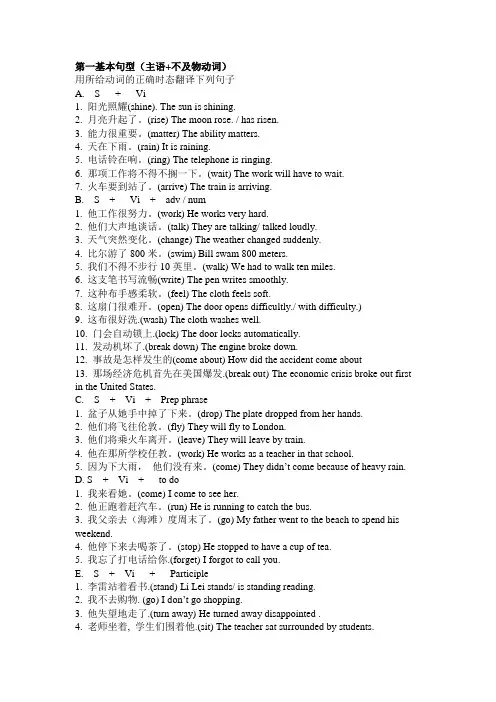
第一基本句型(主语+不及物动词)用所给动词的正确时态翻译下列句子A. S + Vi1. 阳光照耀(shine). The sun is shining.2. 月亮升起了。
(rise) The moon rose. / has risen.3. 能力很重要。
(matter) The ability matters.4. 天在下雨。
(rain) It is raining.5. 电话铃在响。
(ring) The telephone is ringing.6. 那项工作将不得不搁一下。
(wait) The work will have to wait.7. 火车要到站了。
(arrive) The train is arriving.B. S + Vi + adv / num1. 他工作很努力。
(work) He works very hard.2. 他们大声地谈话。
(talk) They are talking/ talked loudly.3. 天气突然变化。
(change) The weather changed suddenly.4. 比尔游了800米。
(swim) Bill swam 800 meters.5. 我们不得不步行10英里。
(walk) We had to walk ten miles.6. 这支笔书写流畅(write) The pen writes smoothly.7. 这种布手感柔软。
(feel) The cloth feels soft.8. 这扇门很难开。
(open) The door opens difficultly./ with difficulty.)9. 这布很好洗.(wash) The cloth washes well.10. 门会自动锁上.(lock) The door locks automatically.11. 发动机坏了.(break down) The engine broke down.12. 事故是怎样发生的(come about) How did the accident come about13. 那场经济危机首先在美国爆发.(break out) The economic crisis broke out first in the United States.C. S + Vi + Prep phrase1. 盆子从她手中掉了下来。
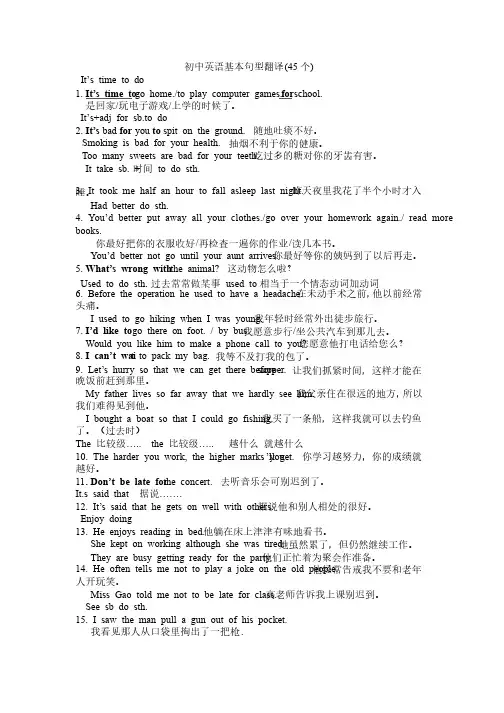
初中英语基本句型翻译(45个) It It’’s time to do school. 1.It’s time to go home./to play computer games./ for s chool. 上学的时候了。
是回家/玩电子游戏/上学的时候了。
It It’’s+adj for sb.to do 2. It’s bad for you to spit on the ground. 随地吐痰不好。
随地吐痰不好。
Smoking is bad for your health. 抽烟不利于你的健康。
抽烟不利于你的健康。
Too many sweets are bad for your teeth. 吃过多的糖对你的牙齿有害。
吃过多的糖对你的牙齿有害。
It take sb. +时间时间 to do sth. 3. It took me half an hour to fall asleep last night. 昨天夜里我花了半个小时才入睡。
睡。
Had better do sth. 4. You’d better put away all your clothes./go over your homework again./ read more books. 读几本书。
你最好把你的衣服收好/再检查一遍你的作业/读几本书。
You’d better not go until your aunt arrives. 你最好等你的姨妈到了以后再走。
你最好等你的姨妈到了以后再走。
5. What’s wrong with the animal? 这动物怎么啦?这动物怎么啦?Used to do sth. 过去常常做某事相当于一个情态动词加动词过去常常做某事 used to 相当于一个情态动词加动词6. Before the operation he used to have a headache. 在未动手术之前,他以前经常头痛。
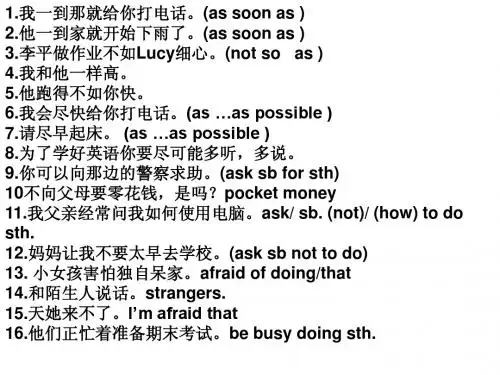
英语五种基本句型:基本句型一:S V (主+谓)基本句型二:S V P (主+谓+表)基本句型三:S V O (主+谓+宾)基本句型四:S V o O (主+谓+间宾+直宾)基本句型五:S V O C (主+谓+宾+宾补)句型一:S+V V能表达完整的意思,是vi,后可接adv、prep短语、Z从句等Eg:1. The sun │was shining. 2. The moon │rose.3. The universe │remains.4. We all │breathe, eat, and drink.5. Who │cares?6. What he said │does not matter.7. They │talked for half an hour. 8. The pen │writes smoothly句型二:S+V+P V不能表达完整的意思,需借助一个表明主语身份或状态的表语构成复合谓语;这类词叫做连系动词:表情况的:be look keep seem;表改变的:get grow become turn。
Eg:1. This │is │an English-Chinese dictionary. 2. The dinner │smells │good.3. He │fell │in love. 6. The trouble│is │that they are short of money.5. He │is growing │tall and strong. 4. Everything │looks │different.7. Our well │has gone │dry. 8. His face │turned │red.句型三:S+V+O V都具有实义,都是S产生的动作,但不能表达完整的意思,必须跟有一个O,即动作的承受者才能使意思完整; 这类动词叫做Vt 。
Eg:1. Who │knows │the answer? 2. She │smiled │her thanks.3. He │has refused │to help them.4. He │enjoys │reading.5. They │ate │what was left over.6. He │said │"Good morning."7. I │want │to have a cup of tea. 8. He │admits │that he was mistaken.句型四:S+ V+ o+ O谓语动词必须跟有两个O才能表达完整的意思; 这两个宾语一个是动作的直接承受者,另一是动作的间接承受者; 通常这一间接承受者用一个介词来连接,当动作的间接承受者在动作的直接承受者之前时这一介词往往被省略。
五个基本句型翻译练习及答案1. 句型:主语 + 动词1. 英文: The cat is sleeping.中文: 猫在睡觉。
2. 英文: They are playing basketball.中文: 他们在打篮球。
3. 英文: I am reading a book.中文: 我在读书。
2. 句型:主语 + 动词 + 宾语1. 英文: She is eating an apple.中文: 她在吃苹果。
2. 英文: He is watching TV.中文: 他在看电视。
3. 英文: We are drinking water.中文: 我们在喝水。
3. 句型:主语 + 动词 + 地点1. 英文: He is swimming in the pool.中文: 他在游泳池游泳。
2. 英文: They are dancing in the classroom.中文: 他们在教室里跳舞。
3. 英文: She is cooking in the kitchen.中文: 她在厨房做饭。
4. 句型:主语 + 动词 + 时间1. 英文: He is studying now.中文: 他现在在研究。
2. 英文: They are sleeping at 10 pm.中文: 他们晚上10点在睡觉。
3. 英文: She is working in the morning.中文: 她在早上工作。
5. 句型:主语 + 动词 + 宾语 + 地点1. 英文: We are playing soccer in the park.中文: 我们在公园里踢足球。
2. 英文: They are having a picnic on the beach. 中文: 他们在海滩上野餐。
3. 英文: She is painting in the garden.中文: 她在花园里画画。
一、英语基本句型句式1:主谓结构(主语+不及物动词)★此句型常用不及物动词或相当于不及物动词的动词短语做谓语。
如:He laughed. 他笑了。
Spring is coming. 春天快来了。
★注意:该句型的谓语由于是不及物动词,所以是没有被动语态的。
如,事故发生在那个街角。
应该是:The accident happened at that street corner.不可以:The accident was happened at that street corner.过去30年中国发生了巨大的变化。
可以说:Great changes have taken place in the past 30 years in China.不可以:Great changes have been taken place in the past 30 years in China.★翻译下列句子:1. 经理还没来。
_____________________________________________.2. 汽车突然停下了。
________________________________________________3. 20**年战争爆发了。
__________________________________________________.4. 你应该努力学习。
_____________________________________________________5. 她昨天回家很晚。
______________________________________________________.6. 那天早上我们谈了很多。
___________________________________________________7. 会议将持续两个小时。
_____________________________________________________8. 在过去的十年里,我的家乡已经发生了巨大的变化。